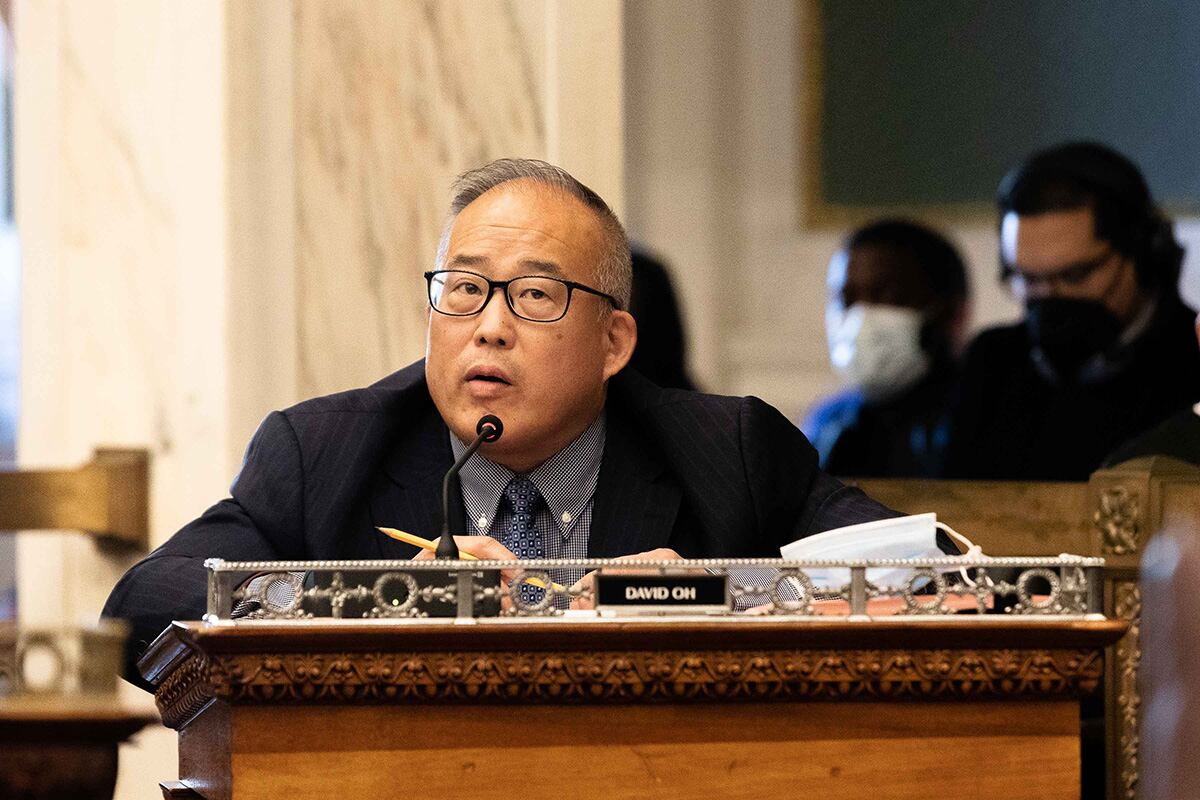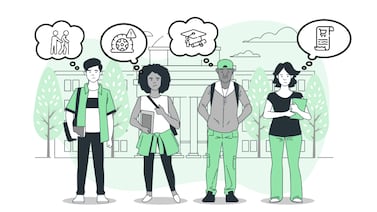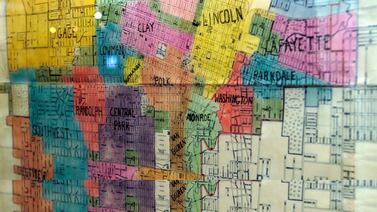Though the voter registration rolls are against him, Republican mayoral candidate David Oh thinks he sees a path to victory in Philadelphia, and that path starts with the city’s schools.
Voters are “not coming out because of the pomp and ceremony. They’re not coming out because of the noise, they’re coming out because they want a change,” Oh said in a recent interview at his campaign office in Northeast Philadelphia. “People want to believe there is a better future for them. And schools are where it can happen.”
Oh, a former City Council member, is running against the heavily favored Democrat Cherelle Parker, who also served on council and was a state representative. In Philadelphia, registered Democrats outnumber registered Republicans seven to one.
The general election is Tuesday, Nov. 7, and the last day to vote early in person is Tuesday, Oct. 31.
Inspired by reader submissions, Chalkbeat asked both candidates to weigh in on the city’s most pressing education issues: school funding, safety, infrastructure, school board appointments, charter schools, and more. You can find Parker’s detailed Q and A here.
In an interview with Chalkbeat, Oh said he favors holding elections for five of the nine members of the Philadelphia Board of Education while the mayor would appoint the remaining four. That would in effect cede the mayor’s primary influence over education in Philadelphia, which is to appoint all members of the board that governs the district.
Oh did not go into detail into how such a hybrid board would work with respect to issues like taxing power. Now, the appointed school board relies on the City Council to allot local tax dollars to the schools. Parker said she opposes an elected board because she wants the council to keep taxing power.
But Oh said that having elected members would make the board more responsive to community concerns. He proposed combining the 10 current councilmanic districts (districts that are aligned with those represented on the City Council) into five, and electing one from each district.
He said he would also seek to promote “equity in resources and facilities” and beef up vocational education. On charter schools, he said: “I am not for or against. I am for good public schools.”
An attorney, Oh was born and raised in Southwest Philadelphia, where he still lives, and represented on the council from 2012 until he resigned to run for mayor earlier this year.
He reiterated that the major issue facing the next mayor is crime — in the city and in the schools. He contends that reducing crime will have a beneficial effect on education by attracting more people to teach in the city and reducing student trauma, among other things.
This interview has been edited for length and clarity.
What are your proposals for improving school safety?
[Students] have every legitimate reason why they cannot focus and why they are afraid. They’ve been traumatized by all this gun violence. They have to see we care. The way I show them we care is I have uniformed officers, school police — no weapon, but looking sharp, being attentive and being accountable. I say ‘when you’re in our custody, you’re in our care’ for people who we arrest. When you’re in our schools, you’re in our care.
I think a lot of our problems come from the fact that people feel neglected. They feel like nobody cares about them, they feel like they have no future.
I think, although well intended, to not provide police, to not provide discipline, to not provide that shows you don’t care when kids are getting killed, shot, and hurt.
People want policing, but they want police reform. They want good policing. They don’t want police brutality. They don’t want ‘stop and frisk,’ I’m against the return of stop and frisk.
How would you address the teacher shortage?
We’re losing teachers to public safety issues, and they’re telling us “we’re getting out of here, because it’s dangerous for us to go to work … this is not what we signed up for and you don’t seem to care.”
The low pay with no visible steps — the more experience you have in Philadelphia, what do you get? What is your future there? And so a lot of teachers look at Philadelphia as their public service time … we lose too many good teachers, and they really want to be here. They want to be a part of the community.
If I wanted to deal with teachers, I would look at recruitment. I would create a more predictable system of how you get paid, and how the pay increases every certain number of years. And it would incentivize staying in Philadelphia longer.
You’ve said you would support an elected school board. How would that work? What would you do when you first take office, before you could change from an appointed to elected board?
I would appoint nine new [members] … start from scratch.
I have really pushed five elected school board members … we can have five councilmanic districts where the people elect a representative … regionally, but not the same as the council districts.
That would give people a level of responsiveness and accountability that they really feel is missing in the school district. … In other words, I would rather have the community tied in with the schools and have some level of tailoring language, culture, educational options, things like that. And recognition of religious issues that are important to their community.
What would your education priorities be as mayor?
Safety in the school, which is a big problem. Number two, it would be equity in resources and facilities ... and I would return the standards of academics, vocational career training, and then I’d try to create a VET program like they do in Germany, Switzerland — vocational educational training.
If someone wants to get certified in a good vocation, there’s a program that I would try to work out with [lawmakers in] Harrisburg, where you do ninth and 10th grade in business theory, academics, all that related to what your career is. Then in 11th and 12th grade, you do part-time [at a] workplace.
What changes would you make to the way the school district is organized?
I’m not really a fan of the way schools are run now with a superintendent in charge of everything … I think it has to be a little more horizontal. There should be a chief innovation officer for technology. One that doesn’t get fired or demoted by the superintendent.
I don’t think the school board should be in the school administration building at all … you have to let the administrators administrate. Let the teachers teach, let the principals be the principals, let the facilities [workers] do the facility, the police do the police and the board looks at the overall but without any interest, without any conflicts.
A Commonwealth Court judge recently ruled the way Pennsylvania funds its schools is unconstitutional and many school districts, including Philadelphia, are underfunded. What would you change about the system?
The city is very wasteful. And nobody likes to hear that, or they already know it.
The poorest neighborhoods in Philadelphia are overtaxed. They have a lot of anxiety, they have a lot of problems, they have a lot of violence and all kinds of things. It’s illegal and it’s unfair.
I would … audit the [property tax] assessment process… we have to create fairness in taxation. … Otherwise, we’re going to drive all our poor folks out of the neighborhood with their kids who go to schools.
I believe the city should contribute more money from the money it has..the taxes have to be accurate, if they are higher, no problem. If they’re lower, whatever they are, they have to be accurate.
The current system is abusive to the poor, the vulnerable, and the low income and that is resulting in a lot of other problems that are very expensive.
That is having a devastating effect on our city. A lot of the problems we face are from people who feel targeted by a bullying, hateful government that doesn’t care about them … they could see it in schools and the libraries and places like that. I would correct that property tax.
How would you deal with the school infrastructure issues like damaged asbestos?
I think there is purposeful inefficiency [in school construction and upkeep]. … In this city, since the colonial days, schools have been a place of political payback.
I would look at serious rightsizing of the district based on the fact that we probably need to build new buildings.
We need to look at the buildings that have asbestos and actually clean them for real and not just coat them. We don’t need to remediate them. We have to remove it.
Do you think there should be more charter schools in Philadelphia?
No, I don’t. I’m not for or against the charter schools … I’m for good public schools. But we’ve had horrible public schools and no response. And therefore there were charter schools.
I think we have enough charter schools.
I would look at the mayor as someone who’s responsible for education for every child … whether it’s at a charter school, a neighborhood public school, a magnet school, a private school, at religious school, or whatever it is, it’s a school … [and it] is the mayor’s responsibility. One of the biggest jobs a mayor can do is to raise the money to put into education.
Would you support private school vouchers?
I think I’m for them.
If [private school families] are going to pay their taxes and send your kids to another school and pay for that, that helps us … it helps us to have them pay their taxes and have open seats … I would like to give them a tax break, to encourage them to do that so I can get the benefits of their tax dollars and those open seats.
If we had more people paying taxes, and paying for their own tuition, we’d have more money, more room in schools. So in that sense, I’m for it.
How would you improve trust between the school district and the communities it serves?
Our issue is how do we deliver a good quality education, a meaningful education in a way that shows the children in our care in our worst neighborhoods, that they have hope for the future? … As a mayor, I have to answer that question.
I think the problem with this whole situation is that the public does not trust the schools anymore … it’s all a scam to them.
You’re going to have to show them a visible difference from almost day one. The neighborhood looks different, the school’s different, the library hours have changed, the whole delivery of services is different.
You have to build credibility. We have such pessimistic people in this city. And it’s one of our biggest problems. Many of them don’t believe school matters, quite frankly, they just see school as a place to send kids and just occupy their time there.
Dale Mezzacappa is a senior writer for Chalkbeat Philadelphia, where she covers K-12 schools and early childhood education in Philadelphia. Contact Dale at dmezzacappa@chalkbeat.org.
Carly Sitrin is the bureau chief for Chalkbeat Philadelphia. Contact Carly at csitrin@chalkbeat.org.








